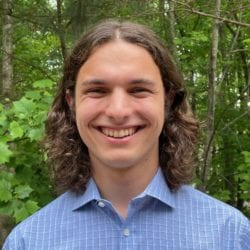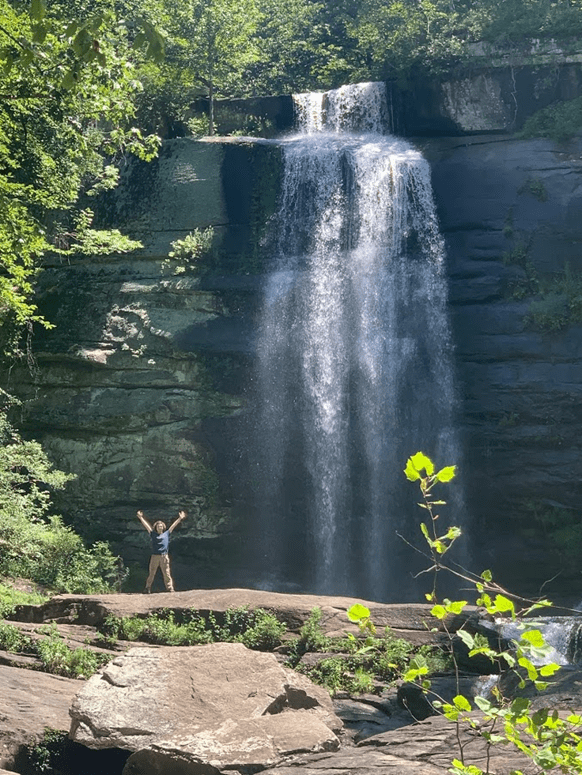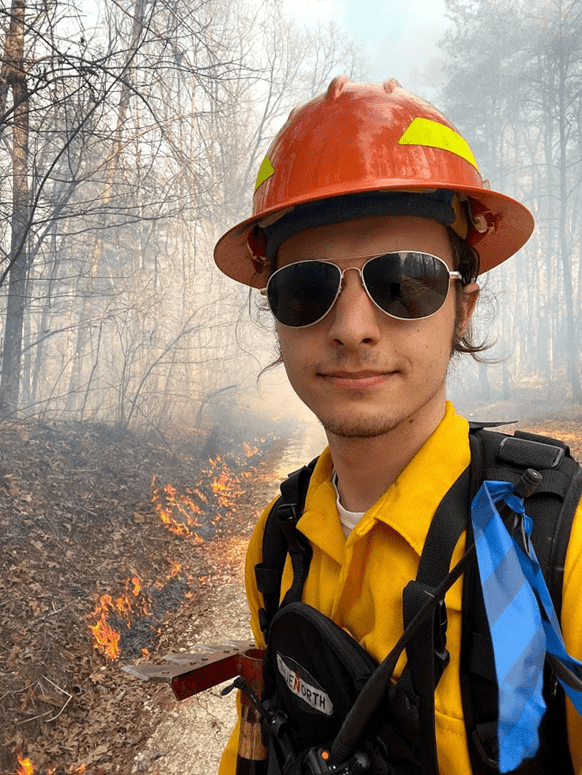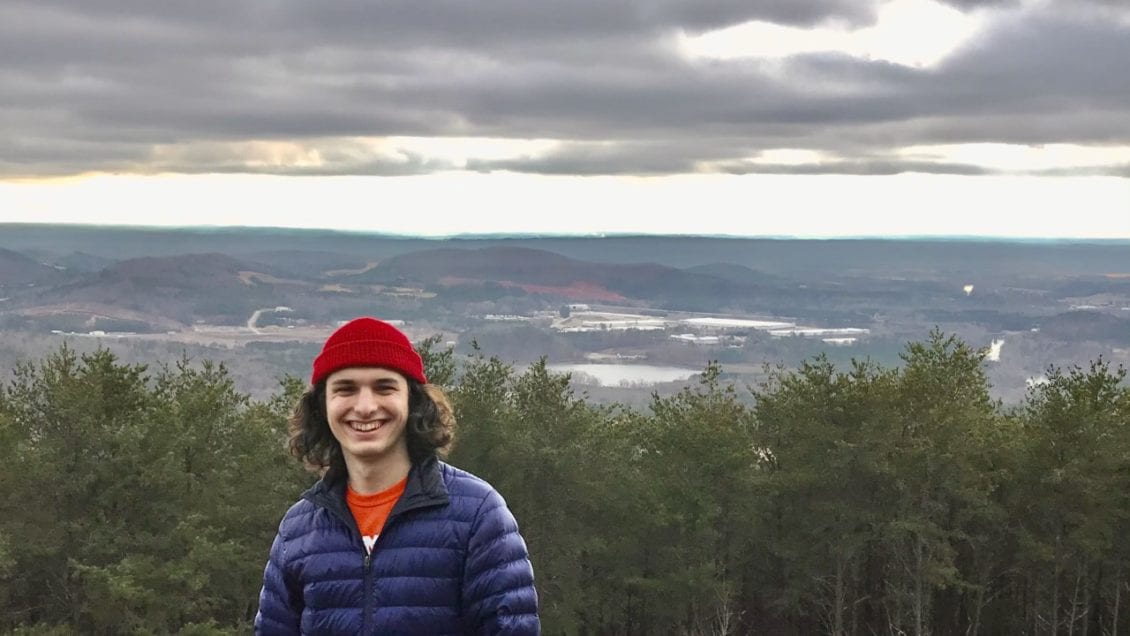Already known as a poet, a volunteer firefighter and a wild mushroom forager, a Clemson University rising senior has received national recognition for his environmental advocacy.
Carson Colenbaugh, a National Scholar and Honors College member, has been named a 2021 Udall Scholar for his work in forest conservation and food justice. He is one of 55 students from 42 colleges and universities to receive the honor and the only recipient from a South Carolina institution.

Colenbaugh grew up in Kennesaw, Ga. on the banks of Proctor Creek, a tributary to the Etowah River. When he’s not in the classroom or leading the Food Collective, you might find him training with Fire Tigers or foraging for wild mushrooms in Pickens and Oconee Counties.
Colenbaugh is a horticulture major with minors in biological sciences and forest resource management. He plans to pursue a Ph.D. in the natural resource sciences as he continues his research on forest ecology and management in order to advocate for conservation.
“I’ve always had a curiosity for the ecological interactions of the Southern Appalachians, and I knew I wanted to use my voice and time to ensure its stability,” he said. “This award gives me reassurance that the work I’ve been doing has had a positive impact on those around me.”
He said he plans to continue bridging the gaps between culture and resource management.
Inquisitive, Enthusiastic, Hard Working

Colenbaugh is described as highly inquisitive, enthusiastic about learning and extremely hard working by Donald Hagan, assistant professor of forest ecology. Hagan has served as Colenbaugh’s professor, research collaborator, chapter advisor for Student Association for Fire Ecology and internship mentor.
“He has become an invaluable member of my research team – and other students in the lab frequently lean on his expertise about fire science, plant identification and related topics,” Hagan said. “I have no doubts that he will be a successful and highly influential member of the fire ecology community.”
Colenbaugh completed an internship with Hagan last summer studying the Jocassee Gorges Management Area. He gained an appreciation for the benefits of prescribed burning.
“After a century of logging, many of the fire-dependent plant communities have been severely reduced,” Colenbaugh said. “Mapping the plant communities of the 40,000-acre region will better inform land managers as they use prescribed fire to restore fire-dependent plant communities to the landscape.”

The Morris K. Udall and Stewart L. Udall Foundation selects recipients on the basis of commitment to careers in the environment, Tribal public policy, or Native health care; leadership potential; record of public service; and academic achievement. He’ll receive $7,000 for his senior year of academic study.
Colenbaugh’s work with Clemson’s Fire Tigers program gave him hands-on experience with planning and executing prescribed burns.
Fire Tigers is a student-led fire crew sponsored by the U.S. Forest Service where students become certified wildland firefighters and have the opportunity to participate in U.S. Forest Service prescribed burns programs. This also gave him the opportunity to volunteer with projects such as restocking trout in the Chattooga River via helicopter.
Voice for Sustainability
In his years at Clemson, Colenbaugh has had extensive field experience in environmental sustainability and food justice, and he is known locally as an important voice and influence in this field.
National Scholars Program Director Sarah Winslow can attest to Colenbaugh’s influence. “I have been particularly impressed with how Carson has built a network of connections with similar organizations in the upstate,” she wrote in her nomination letter. “I can attest that Carson has made a name for himself in the local agricultural and food justice community.”
Colenbaugh has provided service and leadership through Clemson’s Food Collective. This group partners with local organizations to promote environmental sustainability and social justice in South Carolina’s food system.
As the communications director for the Food Collective, Colenbaugh developed a newsletter to advertise school events and community activities. But Colenbaugh made a shift when he saw the major toll COVID-19 took on local organizations such as Sustaining Way and Mill Village Farms, nonprofits that work to provide low-cost organic produce in food deserts.
He decided to rework the newsletter to focus on coordinating volunteers for these organizations.
“By making this switch, we were able to turn an otherwise uneventful year into a time of community service and support,” he said.
To coordinate these efforts, Colenbaugh took on the additional role of director of volunteering for the Clemson Food Collective. Under his leadership, direct community action has become a central focus, including projects such as conducting repairs after flooding, harvesting food, sowing crops, and planting vegetables.
The student organization plans to continue this community focus through partnerships with groups such as the Living Water Foundation, an advocate for rural community health.
Published Writer, Poet
In addition to his research and volunteer efforts, Colenbaugh also educates others through his writing. He writes a column about sustainable foraging for the Clemson Food Collective’s magazine.
His poetry about the Southern Appalachians has been published in Clemson’s literary magazine and in Canary, an online journal focused on the environmental crisis.
Winslow believes Colenbaugh’s writing has a significant influence on educating people about environmental issues.
“Carson integrates his love of nature and horticulture major with his passion for the humanities, especially the written and spoken word,” she said.
“A published writer and poet, Carson’s literary work has the potential to introduce environmentalism to new and different audiences.”
Sarah Winslow, director of National Scholars
Colenbaugh is Clemson’s third Udall Scholar and second in two years. Riley Garvey won last year and William Rice won in 2015.
Robyn Curtis, director of the Office of Major Fellowships, worked extensively with Colenbaugh throughout his application process.
“Although Carson had an impressive record of conservation outreach before COVID, he really took stock of his efforts and took concrete steps to meet the community’s needs in the changing landscape,” Curtis said. “I am so pleased to see his work and potential recognized by the Udall Foundation. He is a very deserving recipient.”
Students interested in the Udall Foundation scholarship or other nationally competitive programs should contact the Office of Major Fellowships at 864-656-9704 or fellowships@clemson.edu.
Get in touch and we will connect you with the author or another expert.
Or email us at news@clemson.edu

